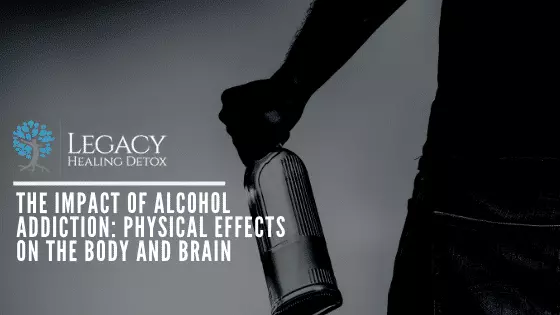
The Impact of Alcohol Addiction: Physical Effects on the Body and Brain
Legacy Healing Center Blog
If alcohol is abused regularly, tolerance and dependency will develop that can rapidly turn into a physical addiction to alcohol. The impact of alcohol addiction can be massive, both on the individual and their relationships.
When physically addicted to alcohol, a person may find it extremely difficult to stop drinking, despite the consequences that they may be facing. When it comes to alcohol, many of these consequences affect the physical health of an individual. Alcohol impacts many bodily functions within the brain and body that can be detrimental if alcoholism is left untreated.
The impact of Alcohol Addiction
Although alcohol is legal and many Americans consume alcohol regularly, it has the potential to be addictive.
“Alcohol continues to be one of the most popular substance addictions that seen throughout the nation among all walks of life. Although nearly 18 million adults suffer from alcoholism, less than 7% of those suffering will seek the treatment that they need to achieve sobriety.”
Alcohol is a central nervous system depressant that lowers inhibitions, decreases anxiety, and affects decision-making abilities. When abused, a person can quickly become physically addicted to alcohol.
Physical addiction to alcohol is characterized by the presence of alcohol withdrawal symptoms when a person abruptly stops drinking.
Signs of alcohol addiction are:
- Inability to control how much and how often alcohol is consumed
- Experiencing withdrawal symptoms when not drinking
- Neglecting personal responsibilities and obligations
- Increasing tolerance to alcohol
- Spending great amounts of time drinking or obsessing about drinking
- Legal or professional consequences due to drinking
When alcohol addiction gets treated in the early stages, a person may experience little to no severe medical complications. However, since alcohol affects chemical balances in the brain, prolonged alcohol abuse can dramatically change the structure and function of the brain.
It is possible that prolonged alcohol abuse can get to a point where the person who is physically addicted to alcohol is unable to function normally without it.
Aside from the physical effects of alcohol, it can also take a toll on the mental health of individuals who are addicted to it. Their risk of depression and other mental health conditions get exacerbated.
Impact of Alcohol Addiction on the Brain
As a central nervous system depressant, several inhibitory sections of the brain get suppressed by alcohol, including speech, thought, memory, breathing, and movement. Also, alcohol can have effects on the mental state of individuals causing changes in mood, feelings of relaxation, impaired judgment, slowed movements, confusion, and even loss of consciousness.
Although most recover quickly from the effects alcohol has on the brain, those who are chronic drinkers may experience these effects for varying lengths of time or begin to develop symptoms of mental illness.
Long term alcohol abuse can change the structure and function of the brain. Two areas of the brain that are most likely to be damaged by alcohol abuse are the cerebellum and the frontal lobe.
The cerebellum controls and coordinates muscle movements. The frontal lobe controls logic, thinking, and mental skills. These areas are damaged after prolonged alcohol abuse causes the shrinkage of white matter or nerve fibers that connect the different regions of the brain.
When these complex changes take place, the communication pathways in the brain that make for healthy human functioning can become impaired. Alcohol addiction can therefore lead to the development of depressive disorders, bipolar disorder, sleep disorders, and emotional response issues.1
Impact of Alcohol Addiction on the Body
Alcohol addiction affects the body inside and out. One of the most common medical consequences of alcohol addiction is liver disease. As a direct result of chronic alcohol abuse, inflammation and fat buildup can increase in the liver.
The liver has over 500 functions, including filtering toxins out of the blood, regulating cholesterol, and regulating blood sugar. Therefore, when liver damage occurs, it has the potential to affect the entire body.
Nearly 20% of all liver transplants in the United States are a result of alcohol addiction. The only way to reverse the damage done on the liver is to completely abstain from alcohol.2
Physical addiction to alcohol can also cause the stomach lining to wear down and lead to the development of stomach ulcers, nutrient deficiencies, and struggles with blood sugar regulation.
Due to the strain alcohol abuse puts on the digestive system, toxins and pathogens can start release into the bloodstream. These toxins and pathogens can affect mood, stress, and the overall health of individuals suffering from alcohol addiction.3
In addition to liver disease and digestive problems, alcohol addiction can cause many other medical complications such as:4
- Pancreatitis
- Anemia
- Issues with Reproductive health
- Diabetes
- Osteoporosis
- Bone density loss
- Vision problems
- Heart disease
- Suppressed immune function
Due to the extensive list of devastating effects alcohol addiction can reap on the body, treating alcohol addiction sooner than later is imperative. The safety and health of individuals who are suffering is paramount.
Fortunately, at Legacy Healing we can help individuals comfortably detox from alcohol and begin their journey of recovery. It is safe to say that physical addiction to alcohol is hazardous to the entire body – and the only way out is through abstinence from alcohol.
Resources
- 1Buddy T. (anon.) (2019). Causes of Brain Shrinkage in Alcoholics. verywellmind. Accessed June 30th 2019.
- 2Nordqvist, C. (2018). What’s to know about alcoholic liver disease? Medical News Today. Accessed June 30th 2019.
- 3Ross, C. C. M.D., M.P.H. (2016). Is Alcohol or Drug Abuse Taking a Toll on Your Digestion? Psychology Today. Accessed June 30th 2019. https://www.psychologytoday.com/us/blog/real-healing/201604/is-alcohol-or-drug-abuse-taking-toll-your-digestion
- 4Tyler, M. Alcohol Addiction: Signs, Complications, and Recovery. Healthline. Accessed June 30th 2019.
